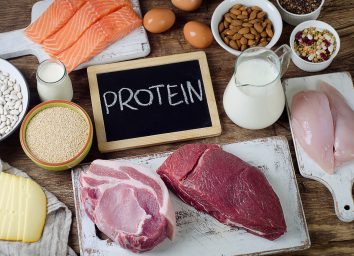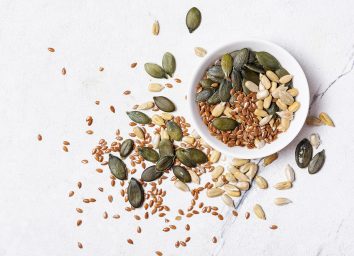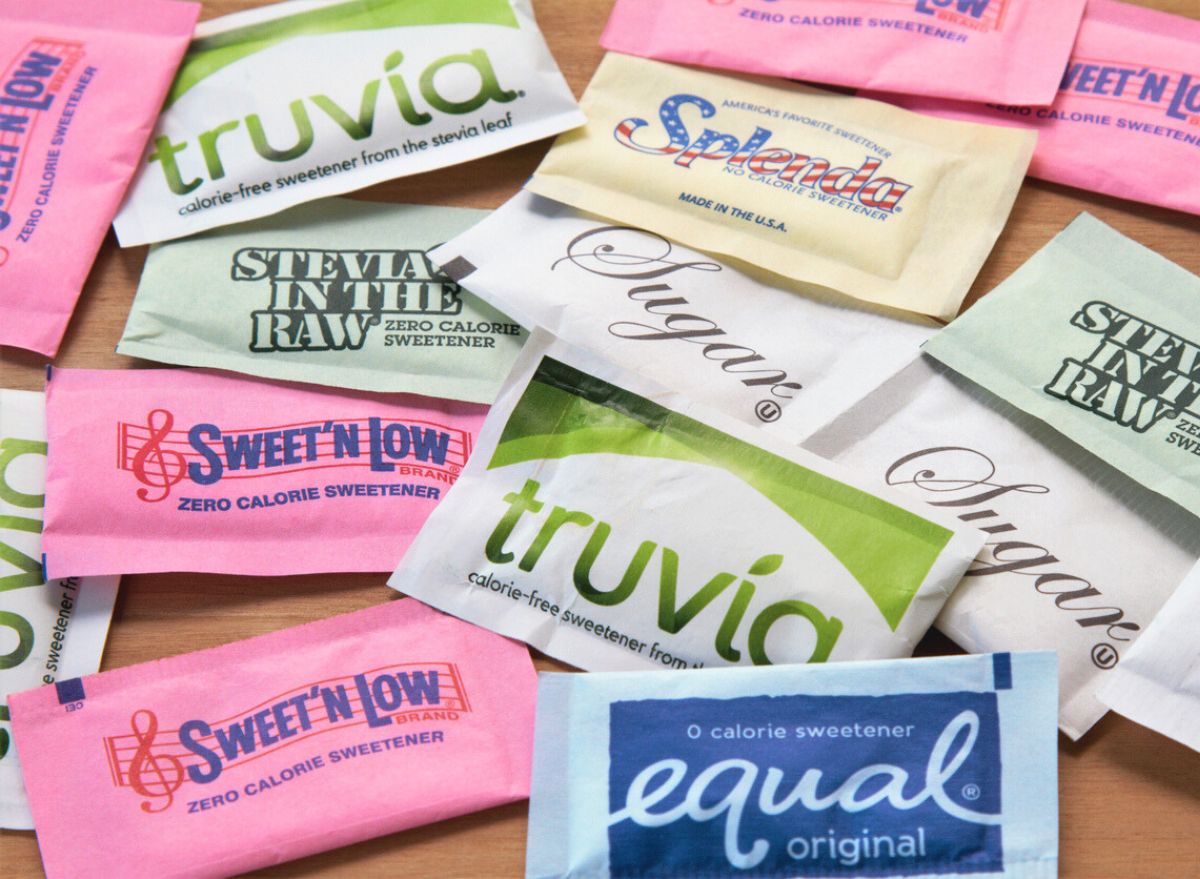
Whether you're baking, adding sweetness to your coffee, or balancing flavors in a savory recipe, sweeteners are a pantry staple. In fact, you may look in your pantry and find multiple sweeteners you've used over the last several months. When keeping health in mind, not all sweeteners are created equally. Sure, they all get the job done of adding sweetness to your food or drink, but some sweeteners may also come with concerning risks if used too often. This is why it can be helpful to know the healthiest sweeteners, as well as the ones you'll want to avoid.
In decades past, refined sugars were the primary sweeteners on grocery shelves. They may still be some of the most common options, but because more and more people are looking for lower-calorie options, the sugar-alternative market has exploded in recent years.
With numerous options available, all touting different qualities, from calorie content to taste and usage, it can be confusing to know what to choose. To simplify your shopping, we have narrowed the options down to the six healthiest sweeteners, as well as six to avoid. Read on to learn more, then check out the 12 Best Low-Sugar Desserts on Grocery Shelves.
The Best Sweeteners
Best: Dates
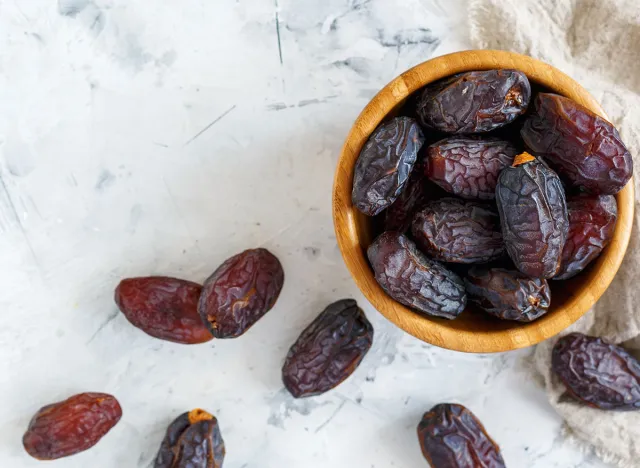
Although it might not be the best sweetener when it comes to your morning coffee because of the texture, pureed dates make a great addition to baked goods. Not only do dates provide the sweetness you are looking for in your cookies and muffins, but they also pack important nutrients.
Fiber is one of the most notable nutrients in dates with nearly 2 grams in a single date. To use dates in your baking, start by creating a paste. You can do this by combining about 2 cups of pitted dates and ½ cup of water in a food processor. Pulse the ingredients, occasionally scraping down the sides, until you've created a paste. Use your date paste in a 1:1 ratio in place of granulated sugar in baked goods recipes.
Best: Allulose
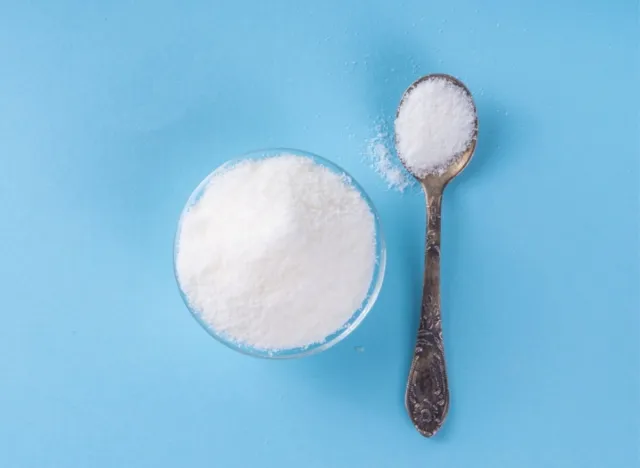
A newer sweetener on the market, allulose has a similar texture and flavor to sugar with far fewer calories and grams of carbohydrates. This sugar substitute is naturally found in only a few foods, including wheat and figs, and provides about 1/10 of the calories in granulated sugar. This makes it a great option for those needing to watch their sugar intake, like diabetics, and individuals wanting to enjoy a sweet flavor for fewer calories.
One study even noted more fat loss experienced in those eating allulose daily compared to the group consuming sucralose, a popular sugar substitute. Although a newer option on the market, allulose doesn't appear to be associated with negative health outcomes and appears to be a safe option. However, more research is needed to understand the long-term outcomes of using this sweetener.
Best: Honey
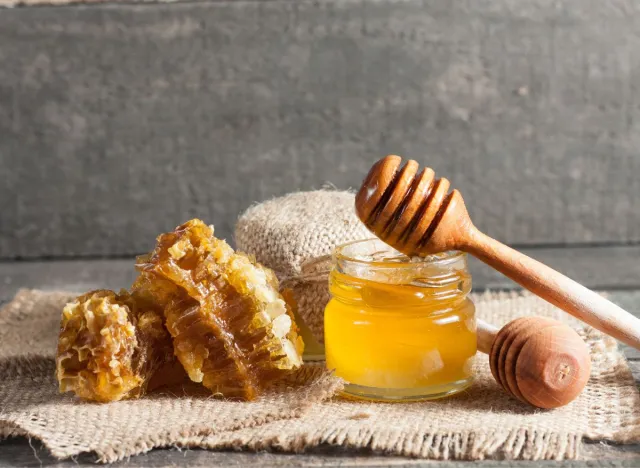
When you are looking to add sweetness to a cup of coffee or tea, honey may come to mind as a healthier alternative to sugar. There may be some truth to this, however, excess calories in any form should be monitored to maintain a healthy weight.
When considering using your calories on a sweetener, honey may be a better option than sugar for a few reasons. First, honey is sweeter than sugar because it contains a higher percentage of fructose. This means you can get away with a smaller portion, and in turn, lower your calorie count, while still reaching your desired sweetness. Honey also has antimicrobial properties and may be able to reduce allergy symptoms. These unique features, in addition to helping you use fewer calories, make honey a healthier alternative to sugar.
Best: Stevia
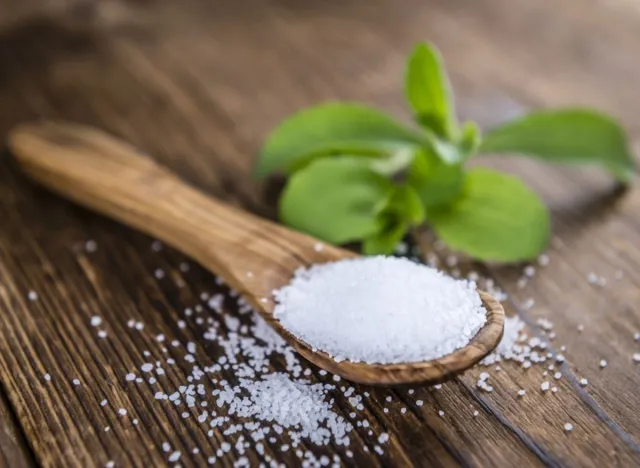
A very low-calorie sweetener that has gained popularity over the last decade, stevia can be used in liquids and baking as a healthier alternative to sugar. Stevia is 200 times sweeter than sugar and is processed from the stevia leaf. With close to zero calories per serving, stevia is a great option for diabetics and others looking to lower their intake of sugar.
Not only can this aid in blood sugar management and weight loss, but some research suggests stevia can improve blood cholesterol levels as well. Stevia does have a licorice-like aftertaste when used in baking, and manufacturers suggest replacing half of the sugar in your recipe with stevia to maintain a desirable flavor while still lowering the sugar content of your baked good.
Best: Monk Fruit Sweetener
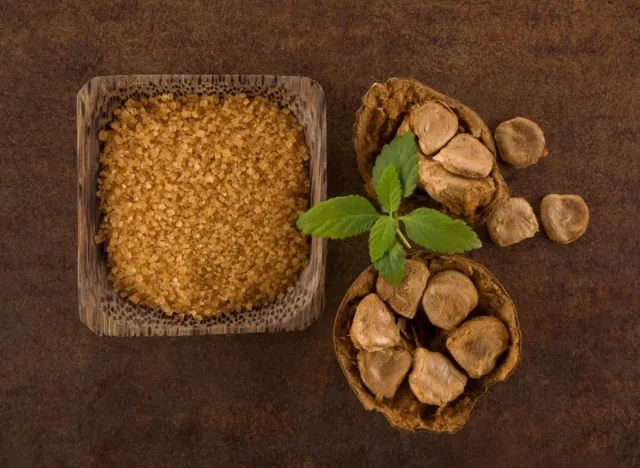
Monk fruit is another zero-calorie sweetener that is far sweeter than sugar. Because of this, it provides many of the same benefits to blood sugar and weight as other low-calorie options on this list. Additionally, monk fruit—a sweetener extracted from the monk fruit—also contains antioxidants called mogrosides. Antioxidants like these can support your cellular health and can reduce DNA damage, a risk factor for the development of certain health conditions.
Monk fruit sweetener can be found on its own or combined with other low and zero-calorie sweeteners to use in baking.
Best: Applesauce
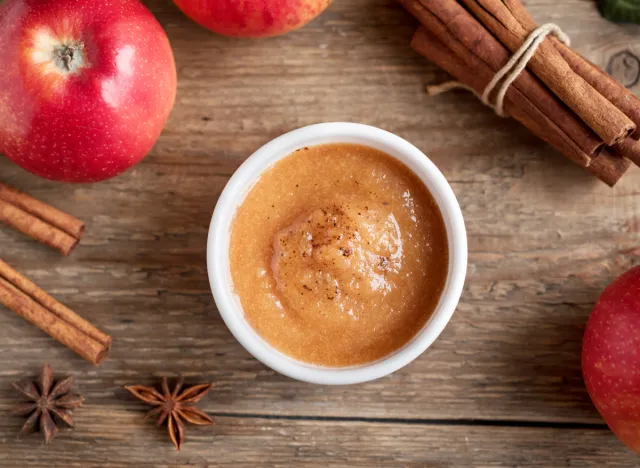
Applesauce is a source of important nutrients, like fiber and vitamin C, making it a healthier alternative to refined sugars that don't provide notable nutrients.
When baking, you can swap sugar for applesauce in a 1:1 ratio. However, because applesauce is a wet ingredient and sugar is dry, you may want to slightly reduce the portions of the other wet ingredients in your recipe. This swap can also add a nice flavor to your baked goods. Ensure you are using unsweetened applesauce to avoid added sugar, and in recipes that don't use much sugar, you can use applesauce as an alternative to oil and butter!
The Worst Sweeteners
Worst: Refined sugar
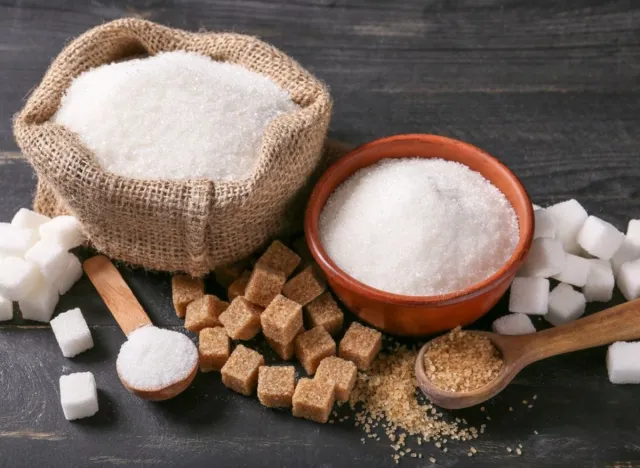
The traditional sugar you add to your coffee or use in your favorite baked goods may be one of the worst options for your health. According to research, dietary sugar can promote obesity, which can increase your risk of a host of health issues. While you don't have to avoid it entirely, the less you consume, the better. Swap sugar in your diet for the "best" options on our list, and limit your portions of added sugar from foods and drinks as much as possible.
Worst: Aspartame
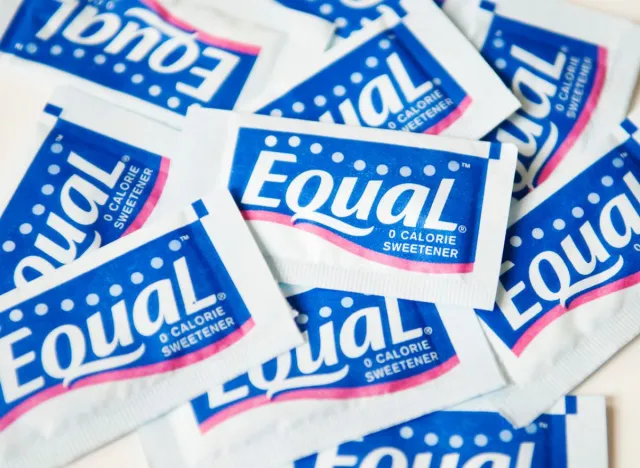
A popular sugar substitute, you are most likely to find aspartame in diet drinks. It is also the main sweetener in Equal, the blue packets you'll find on many restaurant tables. This zero-calorie sweetener may be low in calories and carbohydrates compared to sugar, but it comes with some concerns.
For instance, research suggests aspartame consumption may negatively influence obesity, gut health, and glucose and insulin intolerance. With concerning outcomes like these, you are best off avoiding this ingredient and looking for other low-calorie alternatives.
Worst: Acesulfame K
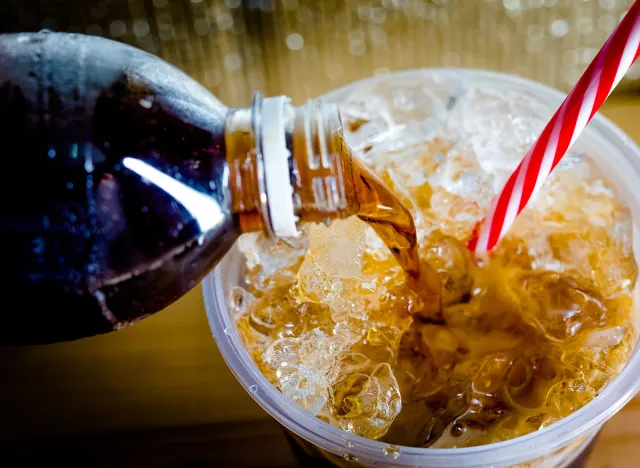
You'll also see this ingredient listed as "acesulfame potassium" or "Ace-K" on food packaging. Most commonly, you'll find it in diet drinks, like soda, juice, and some non-carbonated drinks. Ace-K is often combined with other artificial sweeteners, like aspartame, and has gained popularity for being a low-calorie alternative to sugar.
Although Ace-K is approved by the FDA, there is questionable data linked to the sweetener. One animal study noted a disruption in the gut microbiome and weight gain in male mice after consuming Ace-K for four weeks. This data suggests a potentially negative impact on obesity and its possible associated chronic conditions.
Worst: Xylitol
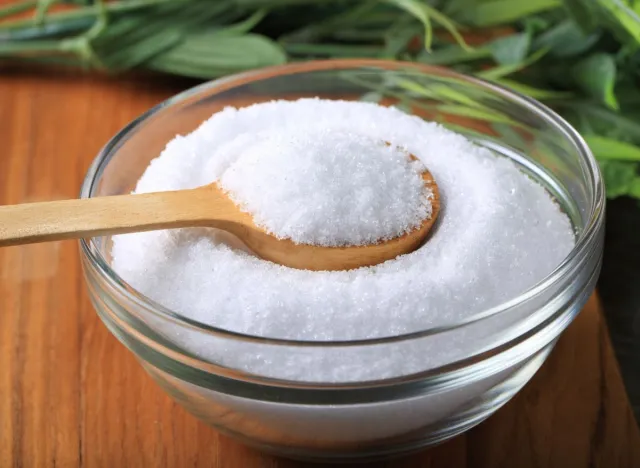
This sweetener is considered a sugar alcohol, and although it is not calorie-free, it contains fewer calories than sugar, which allows it to have less of an impact on blood sugar. This is a positive outcome, but this sweetener can still come with some uncomfortable side effects.
When processing though your digestive tract, sugar alcohols can pull water into your intestine or become fermented by gut microbes. This processing can lead to digestive symptoms, like gas, bloating, and diarrhea. Although these symptoms are unlikely to severely impact health, they can be uncomfortable for a while.
Worst: Sortibol
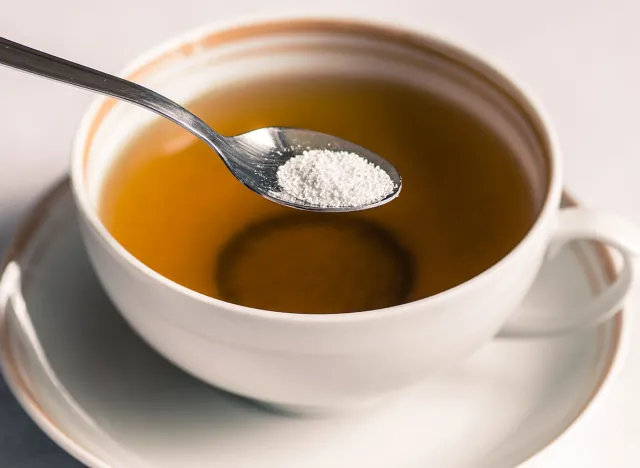
Sorbitol is another type of sugar alcohol that may leave you with uncomfortable digestive symptoms. Sugar alcohols are naturally found in fruit, and are also commercially prepared to add to food and drinks as a lower-calorie alternative to sugar. You'll find sorbitol and other sugar alcohols in diet foods and drinks, and you may even see it in gum, sugar-free candy, and cough drops.
With similar side effects to xylitol, you are better off avoiding this ingredient if you experience side effects. While some people can tolerate sugar alcohols with no problem, others may notice varying levels of discomfort from the digestive-related side effects.
Worst: Saccharine
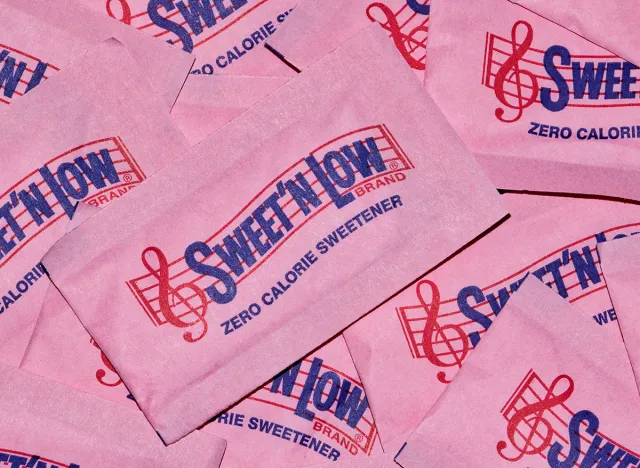
More commonly known as Sweet'N Low, saccharin is the sweetener in these popular pink packets. This artificial sweetener is 300 times sweeter than sugar, which allows you to get away with a small amount while still achieving the desired sweetness in your drink.
You'll often find it combined with other sugar alternatives in diet drinks and low-sugar candy, cough drops, and other diet foods. Several health authorities deem saccharine safe for consumption, although there is some concerning research associated with this ingredient. For example, one study linked saccharine to the bladder cancer development in rats.
Although other studies have not produced the same outcome, it may be best to limit your intake of saccharine and instead choose options on our "best" list.
- Source: FoodData Central. (n.d.-v). https://fdc.nal.usda.gov/fdc-app.html#/food-details/168191/nutrients
- Source: Jürkenbeck K, Haarhoff T, Spiller A, Schulze M. Does Allulose Appeal to Consumers? Results from a Discrete Choice Experiment in Germany. Nutrients. 2022 Aug 16;14(16):3350. doi: 10.3390/nu14163350. PMID: 36014857; PMCID: PMC9414979.
- Source: Han, Y.; Kwon, E.-Y.; Yu, M.K.; Lee, S.J.; Kim, H.-J.; Kim, S.-B.; Kim, Y.H.; Choi, M.-S. A Preliminary Study for Evaluating the Dose-Dependent Effect of d-Allulose for Fat Mass Reduction in Adult Humans: A Randomized, Double-Blind, Placebo-Controlled Trial. Nutrients 2018, 10, 160. https://doi.org/10.3390/nu10020160
- Source: Mandal MD, Mandal S. Honey: its medicinal property and antibacterial activity. Asian Pac J Trop Biomed. 2011 Apr;1(2):154-60. doi: 10.1016/S2221-1691(11)60016-6. PMID: 23569748; PMCID: PMC3609166.
- Source: Asha'ari ZA, Ahmad MZ, Jihan WS, Che CM, Leman I. Ingestion of honey improves the symptoms of allergic rhinitis: evidence from a randomized placebo-controlled trial in the East coast of Peninsular Malaysia. Ann Saudi Med. 2013 Sep-Oct;33(5):469-75. doi: 10.5144/0256-4947.2013.469. PMID: 24188941; PMCID: PMC6074882.
- Source: Sharma, N., Mogra, R., & Upadhyay, B. (2009). Effect of stevia extract intervention on lipid profile. Studies on Ethno-Medicine, 3(2), 137–140. https://doi.org/10.1080/09735070.2009.11886351
- Source: Singh AK, Pandey P, Tewari M, Pandey HP, Gambhir IS, Shukla HS. Free radicals hasten head and neck cancer risk: A study of total oxidant, total antioxidant, DNA damage, and histological grade. J Postgrad Med. 2016 Apr-Jun;62(2):96-101. doi: 10.4103/0022-3859.180555. PMID: 27089108; PMCID: PMC4944358.
- Source: Faruque S, Tong J, Lacmanovic V, Agbonghae C, Minaya DM, Czaja K. The Dose Makes the Poison: Sugar and Obesity in the United States - a Review. Pol J Food Nutr Sci. 2019;69(3):219-233. doi: 10.31883/pjfns/110735. PMID: 31938015; PMCID: PMC6959843.
- Source: Czarnecka K, Pilarz A, Rogut A, Maj P, Szymańska J, Olejnik Ł, Szymański P. Aspartame-True or False? Narrative Review of Safety Analysis of General Use in Products. Nutrients. 2021 Jun 7;13(6):1957. doi: 10.3390/nu13061957. PMID: 34200310; PMCID: PMC8227014.
- Source: Bian X, Chi L, Gao B, Tu P, Ru H, Lu K. The artificial sweetener acesulfame potassium affects the gut microbiome and body weight gain in CD-1 mice. PLoS One. 2017 Jun 8;12(6):e0178426. doi: 10.1371/journal.pone.0178426. PMID: 28594855; PMCID: PMC5464538.
- Source: Mäkinen KK. Gastrointestinal Disturbances Associated with the Consumption of Sugar Alcohols with Special Consideration of Xylitol: Scientific Review and Instructions for Dentists and Other Health-Care Professionals. Int J Dent. 2016;2016:5967907. doi: 10.1155/2016/5967907. Epub 2016 Oct 20. PMID: 27840639; PMCID: PMC5093271.
- Source: Price JM, Biava CG, Oser BL, Vogin EE, Steinfeld J, Ley HL. Bladder tumors in rats fed cyclohexylamine or high doses of a mixture of cyclamate and saccharin. Science. 1970 Feb 20;167(3921):1131-2. doi: 10.1126/science.167.3921.1131. PMID: 5411626.


